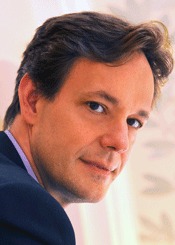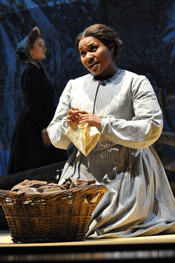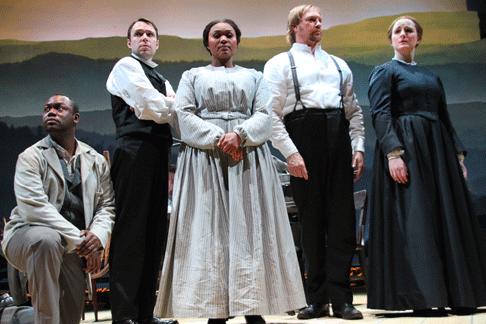(When did you, for example, last hear Elie
Siegmeister’s Strange Funeral in Braddock, the 1936
documentation of a day when Marxism was not yet a curse in America?) Happily,
things are changing — largely due to the commitment to song on the part
of two Americans now moving toward middle age: Jake Heggie and Ricky Ian
Gordon.
True, both men made their strongest mark in opera. Heggie’s Dead
Man Walking, premiered in San Francisco in 2000, has become the
most-performed opera of the 20th century, although in all probability it will
soon by outranked by his Moby Dick, first staged by Dallas Opera a
year ago. And Minnesota Opera offered Gordon’s touching treatment of
Grapes of Wrath in 2007. Although both men are somewhat too easily
pegged as “post-Broadway” and “post-Sondheim,” their
achievement of the past month indicates it is time to take them with greater
seriousness and see them as original and unique voices that elevate the status
of American music. Their newest achievements in songs define new parameters for
the genre.
*******
Heggie returned to Dallas’ Winspear Opera House on April 8, 2011,for
the premiere of a new song cycle, A Question of Light. The six songs,
again a colaboration with Gene Scheer, whose poems respond to works in the
Dallas Art Museum, celebrate the philanthropy of Margaret McDermott, for whom
the Winspear’s auditorium is named. “They are works either given to
the Museum by Margaret or by friends in tribute to her,” explained
Scheer, whose partnership with Heggie finds the two widely referred to as the
“Strauss/Hofmannstal of the 21st century.”
 Jake Heggie [Photo © Ellen Appel]
Jake Heggie [Photo © Ellen Appel]
“We had turned earlier to works of art for inspiration,” Scheer
added “And in Dallas we had gotten to know Margaret, an incredible
philanthropist and a great friend.” Scheer and Heggie toured the Dallas
Museum to study 40 works that fit the definition of the project. “There
were six that immediately triggered my imagination,” Scheer said.
“I found words right away for Magritte, but came up with nothing for
Mondrian — and then one day it was there.”
The works are: The Light of Coincidences by Rene’ Magritte, a
Mayan flint depicting a crocodile canoe from between 600 and 900A.D., Gustave
Caillebotte’s Yellow Roses in a Vase, Piet Mondrian’s
Place de la Concorde, El Hombre by Rufino Tamayo and Gerald
Murphy’s Watch. “Jake had his heart set on the
Tamayo,” Scheer said. “And I loved it as well.”
Although Scheer’s poems stand stably on their own (the audience would
have gained from projection of the texts), they are enhanced by the changing
moods of Heggie’s candidly romantic settings. Heggie sets the cycle in
motion with bell-like Impressionist sounds for Magritte, grows dreamy in
Caillebotte and gains Latin force in flavor in Tamayo. Heggie, long the master
accompanist of his work, partnered baritone Nathan Gunn in the premiere. While
Gunn sings Mozart’s Papageno at the cavernous Met, the 2,200 Winspear
seemed a trifle large for his cultivated delivery.
On the second half of the program, a gala fundraiser for Dallas Opera, Gunn
turned to music reaching from Home on the Range to a “hit” from
Camelot. Here he was almost upstaged by his keyboard partner — and also
his wife — Julie Jordan Gunn, a professor of music at the University of Illinois
at Urbana-Champaign. “Moby Dick took me to a new level in my
composition,” Heggie said. “And these songs are a direct extension
of that musical language and world. “Each part of the cycle asks who we
are and how we fit into the landscape — what a work of art says to us,
and what we bring to it as we look at it as well.”
*******
It was hardly a coincidence that the Virginia Arts Festival scheduled the
world premiere of Rappahannock County for April 12, 2011. For it was
on April 12, 1861 that the attack on Fort Sumter in Charleston Harbor launched
the Civil War. Rappahannock County, a music theater piece composed by
Ricky Ian Gordon with texts by Mark Campbell not only recalls that event, it
traces the fate of the divided nation through the five years of war that
followed. To add to the significance of this cycle of 22 songs that follow the
feelings of those affected by the war the Festival made the premiere the
opening event of its 15th anniversary season.
 Aundi Marie Moore and Faith Sherman [Photo by David Beloff courtesy of Virgina Arts Festival]
Aundi Marie Moore and Faith Sherman [Photo by David Beloff courtesy of Virgina Arts Festival]
In commissioning it, Virginia Festival director Robert Cross asked only for
a work on the Civil War. What exactly it would be was up to Gordon and
Campbell. “I couldn’t see a big three-act opera on the war,”
Gordon says. “The challenge was to make the subject manageable — to
cut it down.” Gordon brought Campbell on board, and they both started
reading.
“Virginia was so central to the war — and so divided!”
Gordon says. “We decided to focus on just one county in the state:
Rappahannock.” The two decided on music theater as their genre, and
Gordon thought in terms of a cycle of songs to be performed by a small group of
singers, each of whom plays a number of roles. Although the final score is
divided into five acts — one for each year of the war — they are
performed without interruption. The work lasts 85 minutes. “The poems
offer no cohesive narrative, they must be performed without
intermission,” the composer says. “That would break the mounting
intensity of the cycle.”
Campbell’s texts draw on letters, diaries and other documents from a
group of people, both black and white, who experienced the impact of war first
hand. The goal of the creative team was a work in which individuals speak with
intimacy. “But the personal is political,” Gordon says, “and
the political is personal. “The piece has the sense of a lens closing in
on a spectrum of individuals and their feelings around slavery and morality in
a profound and poignant way. Mark’s libretto shows what everyone has to
lose — or has lost.”
 Full cast of Rappahannock County [Photo by Rachel Greenberg courtesy of Virginia Arts Festival]
Full cast of Rappahannock County [Photo by Rachel Greenberg courtesy of Virginia Arts Festival]
The acclaim accorded Rappahannock County by the 2,200 people who
packed Norfolk’s Harrison Opera House for the premiere made clear that
Gordon and Campbell had achieved their goal. The work, described by Gordon as
“a series of snapshots of life and loss during the war,” makes no
attempt at narrative unity, but focuses rather on intensely emotional moments
in the lives of 30 individuals portrayed in Norfolk by five extremely talented
young singers. Indeed, soprano Aundi Marie Moore, mezzo Faith Sherman, tenor
Matthew Tuell and baritones Kevin Moreno and Mark Walters were an unusually
well balanced group of singers who clearly had taken the message of this
stellar new work to heart. For the texts Campbell created a language
magnificently suited to their contents. It reflects the period and the events
described with no attempt at dialect-like coloring. Wisely, the texts were
projected as supertitles during the performance.
The 17-pieces orchestra — Rob Fisher conducted Bruce Couglin’s
orchestration of the score — played behind a scrim, on which were
projected telling visuals designed by Wendall Harrington. They included actual
photographs along with landscapes and documents that contributed much to the
easy flow of the score. Gordon had wanted the songs to be performed without
interruption; but, growing applause documented the increasing involvement of
the audience during the premiere performance.
Costumes were by Jessica Jahn; lighting by Robert Wierzel. Kevin Newbury
directed the production.
Rappahannock County is a co-commission of the 2011 Virginia Arts
Festival, Virginia Opera, the University of Richmond and the University of
Texas in Austin, The Norfolk production will be staged at both universities in
September 2011.
*******
Next up for Jake Heggie and Gene Scheer is a commission from Houston Grand
Opera for a set of songs marking the 10th anniversary of the 2001 terrorist
attack on New York City. “Through music, the work will honor Houstonians
affected by the attack,” said HGO general director Anthony Freud in
announcing the commission. “Music, after all, has the ability to tell a
story and enable people to reflect and connect with each other.”
Scheer is developing texts from — among other sources —
interviews with Houston firefighters who went to New York to assist in rescue
operations and from telephone messages left by a Houston-born woman on the
flight that went down in Pennsylvania. Freud has asked Heggie for a
“transportable” work, written for example, voice plus guitar,
violins or flutes. “This will make it possible to perform it in many
different venues from fire stations, city-hall foyers and hospitals,”
Freud said. Plans are not yet definite. Yet, the HGO hopes to premiere the work
in Houston’s Rothko Chapel. This is the eighth Heggie-Scheer
collaboration.
Wes Blomster
image=http://www.operatoday.com/Rappahannock-County—Kevin.gif
image_description=Kevin Moreno [Photo by David Moreno courtesy of Virginia Arts Festival]
product=yes
product_title=A Question of Light, a song cycle by Jake Heggie and Gene Scheer. Winspear Opera House, Dallas, April 8, 2011
Rappahannock County, a musical theater piece by Ricky Ian Gordon and Mark Campbell. Harrison Opera House, Norfolk, Virginia Arts Festival, April 12, 2011
product_id=Above: Kevin Moreno [Photo by David Moreno courtesy of Virginia Arts Festival]